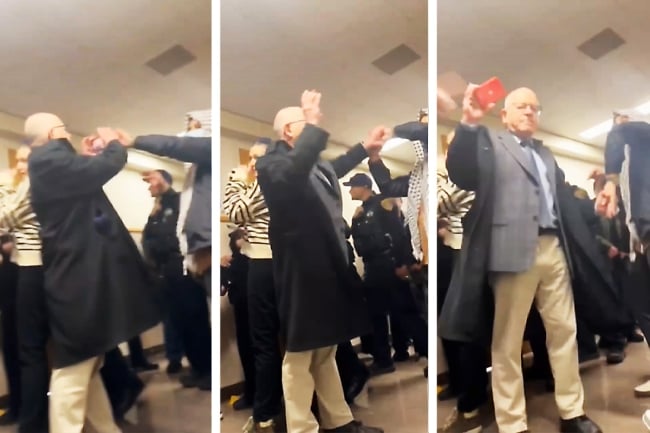You have /5 articles left.
Sign up for a free account or log in.

Three stills from a video showing Jonathan Roth, a San José State University professor, allegedly grabbing the hand of a student who tried to block his phone camera.
Sang Hea Kil
An incident last week at San José State University laid bare just how contentious the Israel-Palestine conflict continues to be on American college campuses—and how elusive agreement can be over the meaning of concepts such as genocide, terrorism and free speech.
The drama at the California State University campus unfolded in two scenes at the same protest. In the first, a guest speech by Jeffrey Blutinger, the Jewish studies director at another CSU campus, on “how to achieve peace between Israel and Palestine,” was cut short after police evacuated him from a classroom and navigated him through an intense pro-Palestinian protest in the hallway.
During the same protest, according to a video provided to Inside Higher Ed, an older man appeared to try to photograph or record protesters with his phone, and he briefly grabbed the hand of someone blocking the camera and pulled their arm down. There was an immediate uproar, the video shows, with a male protester running up to him, yelling in his face and taking his phone before police pushed the protester away.
The older man was San José State professor Jonathan Roth, according to Sang Hea Kil, another professor there. Kil is the faculty adviser for the campus Students for Justice in Palestine chapter, which was part of the protest. She gave Inside Higher Ed the video and said she saw Roth grab the protester, who was a student.
Kil, a professor in the justice studies department, said she told the police officers on scene to arrest her faculty colleague, but they didn’t. She said that, after the Roth confrontation and Blutinger’s exit, students gathered outside and chanted, “Arrest Jonathan Roth.”
Kil said Roth has a long history of Islamophobic comments. “I could have predicted that this was going to happen,” she said. She said she has long called, in vain, for San José State and the California Faculty Association union to take action against Roth for his past statements. She said the student who tried to block Roth’s camera was trying to protect protesters from being doxed.
Roth, a professor in the history department, didn’t respond to requests for comment. One of his lawyers, Andrew T. Miltenberg, emailed Inside Higher Ed to say he is on administrative leave, with pay, and that he was, in fact, trying to record the protesters but did not intend to cause them to be attacked online.
“Prof. Roth is not now, nor was he, interested in doxing anyone,” Miltenberg wrote. “He was merely hoping to record the anti-Israel hatred.”
“Roth was walking to attend a lecture on campus when a group of pro-terrorist supporters forced a confrontation during which Prof. Roth was assaulted,” Miltenberg wrote. “Prof. Roth reflexively attempted to defend himself.”
A San José State spokeswoman declined to provide interviews or answer written questions Monday, saying, “Our internal investigation is ongoing” and pointing to President Cynthia Teniente-Matson’s statement issued the day after the incident, which doesn’t name any names.
“An altercation occurred between protestors, including students, and a member of SJSU’s faculty outside of a classroom where a scheduled guest speaker was presenting during a class session,” Teniente-Matson said.
“Fortunately, no serious physical injuries were reported,” she said. She said that both the guest speaker and students were “escorted from a classroom.” She said an “employee involved in the altercation has been placed on administrative leave, pending additional review pursuant to campus protocols,” and “other members of the SJSU community may also face administrative action.”
Dueling Accusations
Kil, in an interview with Inside Higher Ed, cited her opposition to comments Roth has made for years.
In November, Kil and another faculty member emailed California Faculty Association leaders, asking them to sanction Roth for “quoted racist Islamophobic speech.” This time, she was referencing a statement he’d made to the student newspaper, Spartan Daily, saying, “People have freedom of speech, but I think they should be aware that when they embrace terrorists, people are going to be terrified. It’s a natural reaction.”
Kil, who co-chairs the union’s Palestine, Arab and Muslim Caucus, told the union leaders that Roth’s quote accuses “everyone protesting against the genocide being inflicted on the Palestinians of the Gaza Strip as being guilty of terrorism.”
(Union spokespeople didn’t return a request for comment. Miltenberg, Roth’s lawyer, told Inside Higher Ed that to “oppose radical and illiberal ideologies, whether political or religious, is not to be prejudiced or biased. Prof. Roth’s relationships with all of his students, including Muslim and Palestinians colleagues, students, friends and acquaintances have always been cordial.”)
As for her issues with Blutinger, Kil pointed to a November Q&A he did with The Daily Forty-Niner, a student newspaper at Cal State Long Beach. In one of his answers, Blutinger said that “by no stretch of the imagination can [what’s happening in Gaza] be referred to as a genocide.”
His comments continued, “The issue is that not every war is a genocide. I think sometimes we focus on this idea of making something a genocide and if it’s not a genocide, then we’re saying it wasn’t bad. But if you look at what’s happening in Gaza, it is a war between two different political organizations, the State of Israel and the State of Hamas.”
The night before the Blutinger event, Kil emailed the San José State units that were hosting it, asking them to withdraw their co-sponsorship. She said the units were the departments of history, English and comparative literature and the Office of Diversity, Equity and Inclusion.
“Even as he teaches courses on ‘Comparative Genocide’ at CSU Long Beach, he seems to refuse to publicly recognize the Palestinian genocide that the public, and SJSU’s insightful and politically active students, see clearly before them,” she wrote.
“I feel you might be actively collaborating in an ongoing campaign to erase and deny the genocide which has been condemned throughout the world,” she wrote, adding that, “SJSU and your departments risk further endangering and marginalizing the Muslim and Palestinian students on SJSU’s campus.”
Blutinger, a professor in CSU Long Beach’s history department, said that when he met some San José faculty members, who were helping organize his speech, at the San José airport the morning of the event, he heard that security concerns had prompted a move for the event from a library that allowed general public access to a classroom.
He said he heard that some group had “plastered my face” on social media and called for protests, and one or more people at the university were concerned about the library venue having just one exit. He said the university didn’t tell anyone except the class he was speaking to about the new venue location, and an unmarked police car drove him to campus to speak.
But protesters had found the new location, posted about it online and were already there, chanting and yelling at him, when he arrived, he said. A Students for Justice in Palestine board member, who asked to remain anonymous for fear of being doxed, said the plan hadn’t been to shout Blutinger down until the venue change. She said the original intent was to protest silently but hear what he had to say.
“We decided to do what we could, and we turned it into sort of a sit-in outside,” the student said. The student and Kil estimated that about 50 students took part.
Blutinger said he started speaking nonetheless, and it was fine when the door was closed. But he said a couple of protesters kept trying to enter, and “the door to the classroom kept opening and then it became very hard for the students to pay attention.”
Roughly 15 to 20 minutes in, he said, an officer said he “had to evacuate” but didn’t elaborate why. Blutinger said four officers escorted him out, and it seemed like the one behind him was being pushed, and there was “turmoil and yelling.”
Kil said Blutinger’s removal came after the Roth incident. Inside Higher Ed was unable to contact the student whom Roth allegedly grabbed.
Blutinger, who is himself Jewish, said he didn’t want people to think he was running away from conflict, and he would’ve stayed if the officers had let him.
He said he doesn’t know which individuals or groups were protesting him. But he also said people were objecting to him speaking because “I say there should be peace between Israel and Palestine … they don’t want peace between Israel and Palestine because they don’t want there to be an Israel.”
“They want to see the largest Jewish community in the world somehow destroyed,” he said. “Whether the people are killed or exiled, they don’t say.”
A flier to protest the event said “Show SJSU that Zionists are not welcome here.” Kil defended both that and shouting down Blutinger.
“If Zionism is a form of white settler colonialism, then it is also a form of white supremacy, and my students had every right to speak out against it and its promotion by our campus with their sponsorship of this speaker,” she said.




